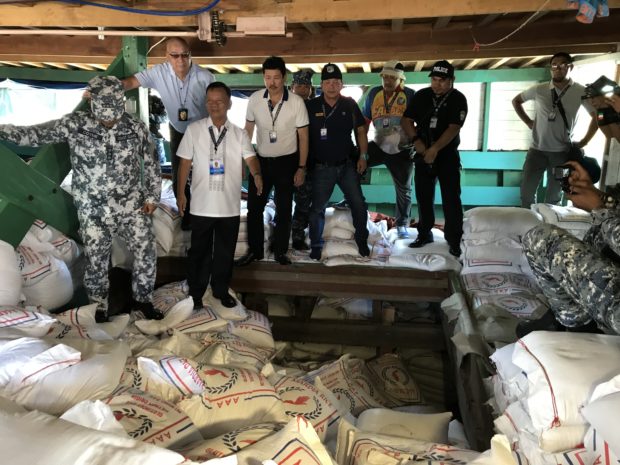Rice crisis blamed on hoarding, corruption, poor agri infrastructure

SMUGGLED RICE Customs Commissioner Isidro Lapeña (third from left) inspects in Basilan province one of two motorboats loaded with rice smuggled from Malaysia. President Duterte has rejected the proposal to legalize rice smuggling whose disruption led to the rice crisis in Zamboanga City, Basilan, Sulu and Tawi-Tawi. —JULIE ALIPALA
The rice crisis in the country has become a blame game.
President Duterte on Sunday said that traders hoarding rice were part of the problem.
Senate Minority Leader Franklin Drilon attributed the country’s rice woes to poor agriculture infrastructure.
For House Minority Leader Danilo Suarez, officials getting commissions from the importation of rice have contributed to high rice prices, which have hit P80 a kilogram in Tawi-Tawi province.
Presidnt Duterte warned traders against hoarding rice, saying he would not hesitate to order the military and police to raid their warehouses.
Article continues after this advertisement“Do not force me to resort to an emergency measure. Because if you do that and time is very limited, I will not allow Filipinos to go hungry,” he said in a speech at Ninoy Aquino International Airport before leaving for Israel.
Article continues after this advertisementNo to legalizing smuggling
The President said he would rather “import and lose” than legalize rice smuggling.
“Smuggled rice unrestrained would promote disorder in this country.”
The government is confiscating smuggled rice as it did not pay any taxes or tariff, he said.
The President said he would rather sell imported rice at a price below the import cost so “the Filipino can afford” it.
He made the remarks a few days after Agriculture Secretary Emmanuel Piñol proposed to legalize rice smuggling to address the rice crisis in the Zamboanga-Basilan-Sulu-Tawi-Tawi area.
Piñol noted that the area relied on rice smuggled from Malaysia before, but this was stopped after the President’s meeting with Malaysia Prime Minister Mahathir Mohamad in July.
Infra projects
In a statement, Drilon urged the government to boost infrastructure projects in agriculture such as the construction of the P11.2-billion Jalaur River Multipurpose Project Phase II by including it in the administration’s “Build, Build, Build” program.
He said the rice crisis happened because “farmers do not get the support they need in terms of infrastructure, resulting in low harvest each year.”
Initiated in 2011, the Jalaur River Multipurpose Project Phase II is projected to boost agricultural productivity and prevent shortages of agricultural products, particularly rice.
It is projected to increase the annual production of rice in Iloilo province to 300,000 metric tons from 140,000 with improved irrigation.
Instead of concentrating on improving rice production, officials are prioritizing the importation of rice, House Minority Leader Suarez said on Sunday.
Commissions
Suarez said unscrupulous officials of the National Food Authority (NFA) may have been receiving “commissions” by colluding with rice cartels to promote rice importation.
“If there’s (rice) importation, there’s a commission. That has been the suspicion even before,” Suarez told the Inquirer.
He said the NFA should anticipate the production and supply of rice for a certain period to avert the unnecessary spike in prices.
“Those who control the cartel of rice know that our supply is not sufficient (to meet) the demand. Hence, importation is a necessity,” Suarez said.
“You cannot have a cartel without close cooperation with NFA officials,” he added.
The NFA has been overly diligent in importing rice, but has miserably failed to fulfill its mandate to buy palay (unmilled) rice from local farmers, according to Davao City Rep. Karlo Nograles.
No 15-day buffer
Nograles, who called out the NFA for diverting P7 billion in public funds earmarked for rice purchase to settle its debts, said this was a major reason for the agency’s failure to maintain a 15-day buffer stock of rice.
He said this was contained in a recent audit report of the Commission of Audit (COA), which came to light after a supply shortage resulted in the prices of rice to skyrocket in several provinces.
The COA report prompted Nograles to summon NFA Administrator Jason Aquino and other agency officials to appear at a hearing at the House of Representatives on Monday.
“The COA records clearly showed that the NFA was quick to import, but was very slow in purchasing palay from our own farmers,” said Nograles, chair of the House appropriations committee.
Citing the report of state auditors, he said the NFA bought only 28,514 MT of palay from farmers in 2017, just 18 percent of its target of 153,483 MT.
However, the Davao lawmaker said the NFA was able to easily meet its target of buying 250,000 MT of the staple from foreign sources.
Threat to security
Senior Deputy Minority Leader Rep. Lito Atienza said Piñol and Aquino must resign for failing to carry out their responsibilities.
“The biggest threat to national security is not the (communist rebels), but (the possibility) of an acute food shortage,” Atienza said.
He said it was also unacceptable for Piñol to issue defeatist remarks that the Philippines would have to import fish.
“Is he preparing the mind of the people (to accept) that stupidity? We are an archipelago surrounded by bodies of water and gifted by thousands of lakes, streams and rivers where fishes abound,” Atienza said.
Piñol, Aquino to stay
Despite growing calls for the resignation or sacking of the agriculture secretary and NFA head, President Duterte is not inclined to fire them.
The President said he did not “see any serious offense” and that “we have not really lost anything except that there’s an aberration in the market.”
“All officials including me are bound by laws on the matter—rice whatever it is. There are laws to be followed. Maybe the laws are weak or unenforceable. All we have to do is to improve on these laws, not necessarily fire people,” he added.